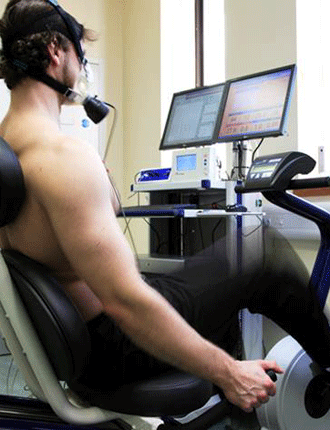September
Brief bouts of exercise begin to reverse heart abnormalities in people with type 2 diabetes

A study from Newcastle University is the first to show that high intensity intermittent exercise training improves heart structure and benefits diabetes control in patients with type 2 diabetes.
Publishing in Diabetologia (the journal of the European Association for the Study of Diabetes), Professor Michael Trenell and Sophie Cassidy of MoveLab at Newcastle University tested the effect of repeated short periods of up to 2 minutes of intense cycling, called high intensity intermittent exercise, on diabetes control and the heart.
People with type 2 diabetes are twice as likely as those without diabetes to have heart disease, and heart disease is the leading cause of death and complications for people with type 2 diabetes.
The effect of diabetes on the heart happens early, with changes in the structure and function of the left ventricle (the heart’s main pump), prior to any symptomatic cardiac disease. Despite the importance of the heart, there are few treatment options to improve its structure and function.
A physically active lifestyle is known to help manage type 2 diabetes and is recommended alongside a good diet, as it is for people without diabetes. Despite the well documented benefits of a physically active lifestyle on diabetes control, the direct effects of exercise on the heart of people with diabetes is not known. Short periods of more intense physical activity raise the heart rate more than longer periods at a modest intensity.
Professor Mike Trenell said: “We’ve shown that short bursts of exercise improve the heart of people with Type 2 diabetes and benefits the control of their diabetes. If patients struggle to do 30 minutes of exercise then shorter, more manageable chunks still help and this includes any activity that gets the heart going such as taking the stairs instead of the lift.”
The researchers found that high intensity intermittent exercise significantly improved cardiac structure and function. The exercise particularly benefited the left ventricle, identified to be altered with type 2 diabetes, which was shown to become stronger and work more efficiently. There was a significant but modest improvement in diabetes control.
Benefits to the heart and to diabetes control
The authors write: “This study demonstrates, for the first time, that exercise can begin to reverse some of the early cardiac changes that are commonly found in people with type 2 diabetes. Interestingly, the data also suggest that this type of high intensity intermittent exercise benefits both the heart and diabetes control, but the benefits appear to be greatest in the heart. The strong positive effect of exercise on the heart is, although completely logical, a message that needs to be communicated to people with type 2 diabetes more clearly.”
The study included 23 people with type 2 diabetes who were randomised to 12 weeks of high intensity intermittent exercise (n=12; aged 45 to 70yrs, 8 men) or who continued their standard care (n=11; 46 to 71yrs, 10 men). Cardiac structure and function were measured using advanced magnetic resonance imaging techniques. Diabetes control was assessed by a standard oral glucose tolerance test.
In the study they conclude that: "The data reinforce how important a physically active lifestyle is for people with type 2 diabetes. Our findings also suggest that exercise does not have to be 30 minutes of continuous exercise – repeated short bouts of higher intensity exercise give strong benefits to the heart. Getting more physically active is, quite literally, at the heart of good diabetes control.”
This study adds to the life-changing diabetes research at Newcastle University to try to understand how diabetes and its complications develop and explore the ways to treat and manage diabetes.
Reference: High intensity intermittent exercise improves cardiac structure and function and reduces liver fat in patients with type 2 diabetes: a randomised controlled trial. Sophie Cassidy, Christian Thoma, Kate Hallsworth, Jehill Parikh, Kieren G. Hollingsworth, Roy Taylor, Djordje G. Jakovljevic, Michael I. Trenell.
(Press release adapted with thanks from Diabetologia)
published on: 10 September 2015
